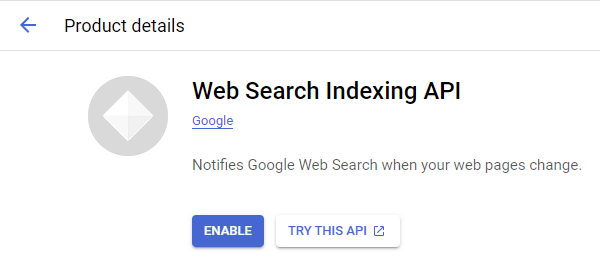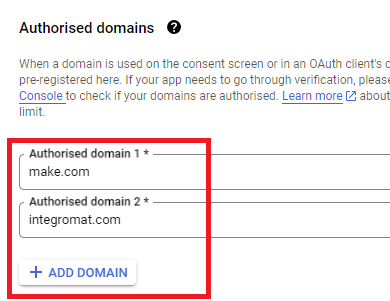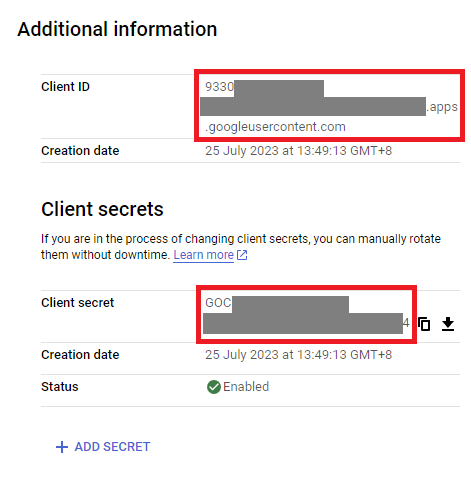What are you trying to achieve?
I’m trying create a simple automation in Make. It’s triggered by a webhook immediately after a form is submitted. From there, I want to send an email to the person who submitted the form. But connecting with my personal gmail account has been unsuccessful so far.
I’ve only been using Make.com for a few days and I’ve got a tiny bit of web development experience. But I’m a bit stuck right now.
Steps taken so far
I’ve done everything mentioned in the article below - created project in Google Cloud, enabled APIs, etc. But when I try connecting again, I’m getting a message saying 'Access Blocked: integromat.com has not completed the Google verification process.
Screenshots: scenario setup, module configuration, errors
1 Like
After creating a new project, Do the following:
- Search for API & services then search for Gmail API, click enable Gmail API
- By the left side bar, Go to oauth consent screen, select external user and click create,
- Scroll down, under app information, enter a name for your app and enter your email.
- Scroll down under authorized domains, enter make.com and integromat.com
- Under developer contact information, enter your email address
- Save and continue
- Add this scope manually. https://mail.google.com/, scroll down and click update
- Go to add test users and enter your Gmail
- Create Gmail client credentials and you’re good to go
1 Like
Cheers, @Greatness_Workflows. I’ve started the whole thing again from scratch and this time, the interface was slightly different. This alone is confusing as hell. All I did differently at first was enable Gmail API only instead of the Google Drive API too.
I had a problem with the redirects after following your instructions, but managed to find the correct one after a few minutes. Everything is working now, but damn, this stuff is confusing. 
Thanks a lot for your support.
1 Like
Looks like you did not expand the advanced settings and put the project id and key in the connection settings, because that error message indicates that the connection is using the default Make’s GCP app and not the one you created.
How to Connect and Use Google APIs in Make!
0. Prerequisites
1. Enable Google APIs
2. OAuth Client
Direct Link: https://console.cloud.google.com/apis/credentials
-
2a. Create “OAuth client ID” Credentials
-
2b. Insert all the Google Redirect URIs for your app
Insert All Google Redirect URIs
Here are some commonly-needed redirect URIs you need for your Google Cloud Console OAuth app. If you set these up, you can reuse the same GCP app for other Google apps and modules on Make.
https://www.make.com/oauth/cb/oauth2
https://www.make.com/oauth/cb/google
https://www.make.com/oauth/cb/google/
https://www.make.com/oauth/cb/google-custom
https://www.make.com/oauth/cb/google-restricted
https://www.make.com/oauth/cb/google-cloud-speech
https://www.make.com/oauth/cb/google-search-console
https://www.make.com/oauth/cb/google-analytics-4
https://www.make.com/oauth/cb/google-ads2
https://www.make.com/oauth/cb/google-ads2/
https://www.make.com/oauth/cb/youtube
https://www.make.com/oauth/cb/chrome
Including These Google Redirect URIs
You are also required to insert the legacy URLs below from the old Integromat system that not been migrated to Make yet (same as the above list, but replace “make” with “integromat”):
https://www.integromat.com/oauth/cb/oauth2
https://www.integromat.com/oauth/cb/google
https://www.integromat.com/oauth/cb/google/
https://www.integromat.com/oauth/cb/google-custom
https://www.integromat.com/oauth/cb/google-restricted
https://www.integromat.com/oauth/cb/google-cloud-speech
https://www.integromat.com/oauth/cb/google-search-console
https://www.integromat.com/oauth/cb/google-analytics-4
https://www.integromat.com/oauth/cb/google-ads2
https://www.integromat.com/oauth/cb/google-ads2/
https://www.integromat.com/oauth/cb/youtube
https://www.integromat.com/oauth/cb/chrome
Note 1: Due to inconsistencies in Make’s implementation of the connections, there are two separate entries where has one is google and another ending in a forward slash google/ - you might need one or the other, so we have to use both!
Note 2: Once you’ve set these up, you can use/reuse the same Google OAuth App ID + Secret for all the supported Google connections and modules on Make - you’ll just have to enable the relevant Google APIs!
3. OAuth consent screen
Direct Link: https://console.cloud.google.com/apis/credentials/consent/edit
-
3a. Insert Two Authorised Domains
-
Insert make.com and integromat.com
-
Fill in other required fields
-
Click “Save and Continue”.
-
3b. Add All Scopes
-
Click “Add or Remove Scopes”
-
Select 100 “Rows per page”, for each page, check all the rows, OR
-
Manually type in the scopes you need
-
Click “Update” at the bottom
-
3c. Step through and go to dashboard
At the last step/page, click “BACK TO DASHBOARD” instead of “Prepare for Verification”

-
3d. Publish your GCP OAuth2 app
You will need to set your OAuth application to “Production”, otherwise the credentials expire very frequently.
-
To do this, go back to “OAuth consent screen”
-
Then click the “PUBLISH APP” button
-
Then click the “CONFIRM” button
4. Create New Connection (HTTP, or respective Google module)
You can find the Client ID and Client Secret in the OAuth2 app you created in GCP, on the right-hand side of where you inserted the callback URLs in step 2:
Related Topics:
Hope this helps! Let me know if there are any further questions or issues.
— @samliew
1 Like
Yeah. You can mark that as a solution so others can benefit from it.
1 Like
Cheers, @samliew. I got round it eventually, partially thanks to reading your comments from a previous post and partially from reading the error messages a little more closely.











